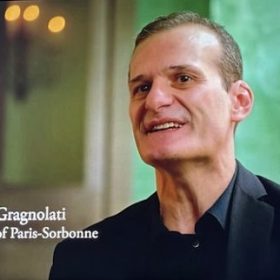
Manuele Gragnolati
CHARLES SPERONI VISITING ASSOCIATE PROFESSOR, SPRING 2024
Professor of Italian Literature, Sorbonne Université; Senior Research Fellow, Somerville College, Oxford; Associate Director, ICI Berlin Institute for Cultural Inquiry
Manuele Gragnolati is Professor of Italian Literature at Sorbonne Université, Associate Director of the ICI Berlin Institute for Cultural Inquiry, and Senior Research Fellow at Somerville College, Oxford. He studied Classical Philology, Medieval Studies, and Italian Literature at the Universities of Pavia (BA and MA), Paris IV-Sorbonne (MA) and Columbia in NYC (PhD). Before joining Sorbonne Université, he taught at Dartmouth College from 1999 to 2003 and from 2003 to 2015 at the University of Oxford, where he was Full Professor of Italian Literature.
A significant part of his research, including his first monograph Experiencing the Afterlife: Soul and Body in Dante and Medieval Culture (2005), focuses on Dante and medieval culture, especially on the significance of corporeality in thirteenth- and fourteenth-century eschatology. He is also interested in the concept of linguistic subjectivity from Dante to the present, in modern appropriations of medieval texts, and in feminist and queer theory. His second monograph Amor che move: Linguaggio del corpo e forma del desiderio in Dante, Pasolini e Morante (2013), offers a diffractive exploration of body, language, and desire in Dante and two authors who have engaged with Dante’s oeuvre in the late twentieth century from a minor, ‘eccentric’ position.
Lyric poetry is another of his interests and in this field he has collaborated on a substantial commentary on Dante’s Rime and published essays on medieval and modern authors as well as the volume Possibilities of Lyric: Reading Petrarch in Dialogue (2020), which he coauthored with Francesca Southerden and which explores the potential of the lyric mode through a comparative reading of Petrarch’s Canzoniere. He is currently working on a book project that explores medieval texts by Dante, Petrarch, and Boccaccio with a posthuman approach.
Manuele enjoys studying and teaching literature for its critical potential to challenge normative ways of thinking and is particularly interested in texts that propose different figurations of reality, whether in the past or in the present. He believes in an interdisciplinary approach to culture and in collaborating with colleagues with different intellectual histories and backgrounds. An example is the The Oxford Handbook of Dante (2021), which he coedited with Elena Lombardi and Francesca Southerden and which includes 45 essays by scholars from all over the world and offers an updated, transnational, and plural take on Dante’s oeuvre. He has run several interdisciplinary projects on Dante, Elsa Morante, Pier Paolo Pasolini, and other topics which have often resulted in collective volumes, including: Openness in Medieval Europe (2022); ‘Petrolio’ 25 anni dopo. Biopolitica, eros e verità nell’ultimo romanzo di Pier Paolo Pasolini (2020); Claude Lefort, Dante’s Modernity: An Introduction to the ‘Monarchia’ (2020); Vita nova. Fiore. Epistola XIII (2018); De/Constituting Wholes: Towards Partiality Without Parts (2017); The Scandal of Self-Contradiction: Pasolini’s Multistable Subjectivities, Traditions, Geographies (2012); Desire in Dante and the Middle Ages (2012); Metamorphosing Dante: Appropriations, Manipulations and Rewritings in the Twentieth- and Twenty-first Centuries (2011); Dante’s Plurilingualism (2010); Aspects of the Perfomative in Medieval Culture (2010); The Power of Disturbance: Elsa Morante’s ‘Aracoeli’ (2009).
Education
- PhD in Italian Studies, Columbia University (1999)
- MA in Italian Studies, Université Sorbonne Pari IV (1994)
- BA and MA in Classics, Università di Pavia (1992)
Featured Works
-
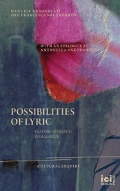
- Possibilities of Lyric
- ICI Berlin Press, 2020
-
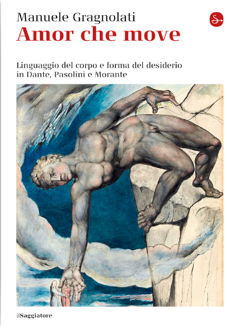
-
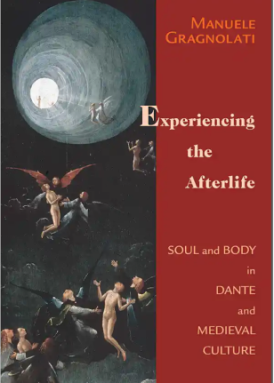
- Experiencing the Afterlife
- University of Notre Dame Press, 2005
-
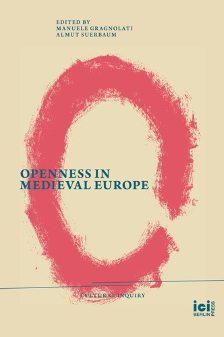
- Opennes in Medieval Europe
- ICI Berlin Press, 2022
-
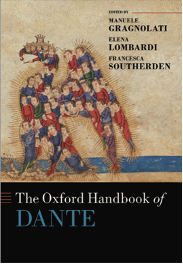
- The Oxford Handbook of Dante
- Oxford University Press, 2021
-
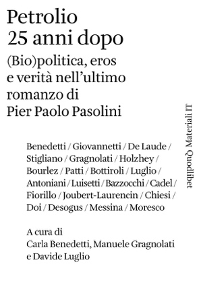
- Petrolio’ 25 anni dopo
- Macerata: Quodlibet, 2020
-
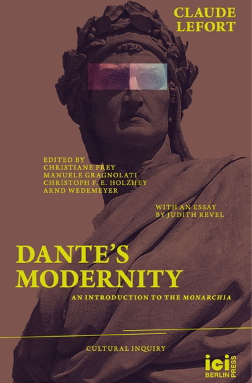
- Claude Lefort, Dante’s Modernity
- ICI Berlin Press, 2020
-
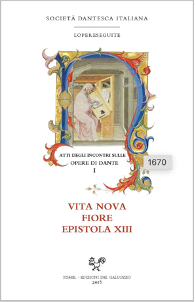
- Vita nova. Fiore
- SISMEL – Edizioni del Galluzzo, 2018
-
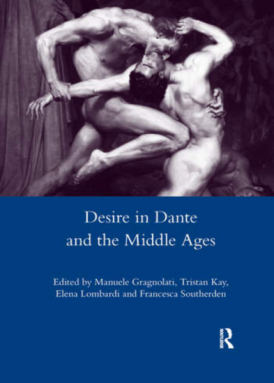
- Desire in Dante and the Middle Ages
- Legenda, 2012
-
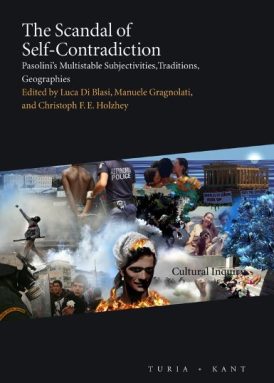
- The Scandal of Self-Contradiction
- uria + Kant, 2012
-
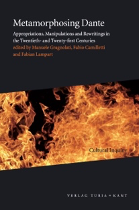
- Metamorphosing Dante
- Turia + Kant, 2011
-
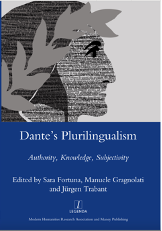
- Dante’s Plurilingualism
- Legenda, 2010
-
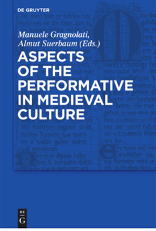
- Aspects of the Performative in Medieval Culture
- de Gruyter, 2010
-
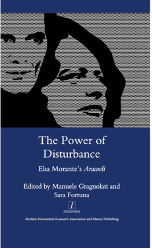
- The Power of Disturbance: Elsa Morante’s ‘Aracoeli’
- Legenda, 2009
Selected Publications
Articles
- ‘Lyric Poetry’, in A Companion to Dante’s “Other” Works, ed. by Zygmunt Baranski and Theodore Cachey (Notre Dame: Notre Dame University Press, 2022), p. 1-34
- ‘Eschatological Anthropology’, in The Oxford Handbook of Dante, ed. by Manuele Gragnolati, Elena Lombardi, and Francesca Southerden (Oxford: Oxford University Press, 2021), pp. 447–63
- ‘Weathering the Afterlife: The Metereological Psychology of Dante’s Comedia’, in Weathering: Ecologies of Exposure, ed. by Christoph F. E. Holzhey and Arnd Wedemeyer (Berlin: ICI Berlin Press, 2020), pp. 63–91; with Nicolò Crisafi
- ‘Insegnare con un classico. La complessità di Dante e lo spirito critico’, in In cattedra. Il docente universitario in otto autoritratti, ed. by Chiara Cappelletto (Milano: Cortina, 2019), pp. 177–214
- ‘Autobiografia d’autore’, Dante Studies, 136 (2018), p. 143–160; with Elena Lombardi
- ‘Poetry Without End: Reiterating Desire in Petrarch’s RVF 70 and 23’, California Italian Studies, 8, n. 1 (2018), pp. 1–13; with Francesca Southerden
- ‘XVI: Politics of Desire’, in Vertical Readings in Dante’s ‘Comedy’: Volume 2, ed. by George Corbett and Heather Webb (Cambridge: Open Book Publishers, 2016), pp. 101–26
- ‘Active Passivity? Spinoza in Pasolini’s Porcile’, world picture, 10 (2015), pp. 1–10; with Christoph F. E. Holzhey
- ‘Differently Queer: Sexuality and Aesthetics in Pier Paolo Pasolini’s Petrolio and Elsa Morante’s Aracoeli’, in Elsa Morante’s Politics of Writing: Rethinking Subjectivity, History and the Power of Art, ed. by Stefania Lucamante (Madison: Fairleigh Dickinson University Press, 2014), pp. 205–18
- ‘Paradiso XIV e il desiderio del corpo’, Studi Danteschi, 78 (2013), pp. 285–309
- ‘Analogy and Difference: Multistable Figures in Pasolini’sAppunti per un’Orestiade africana‘, in The Scandal of Self-Contradiction: Pasolini’s Multistable Subjectivities, Traditions, Geographies, co-ed. with Luca Di Blasi and Christoph F. E. Holzhey (Vienna: Turia + Kant, 2012), pp. 119–33
- ‘Dante after Wittgenstein: “Aspetto” Language, and Subjectivity from Convivio to Paradiso‘ (with Sara Fortuna), in Dante’s Plurilingualism: Authority, Knowledge, Subjectivity, co-ed. woth Sara Fortuna and Jürgen Trabant (Oxford: Legenda, 2010), pp. 223–48
- ‘Trasformazioni e assenze: la performance della Vita nova e le figure di Dante e Cavalcanti’, L’Alighieri 35 (2010), 5-23
- ‘”Attaccando al suo capezzolo le mie labbra ingorde”: corpo, linguaggio e soggettività da Dante ad Aracoeli di Elsa Morante‘, Nuova corrente, 55 (2008), 85–123; with Sara Fortuna
- ‘Nostalgia in Heaven: Embraces, Affection and Identity in Dante’s Comedy’, in Dante and the Human Body, ed. by John Barnes and Jennifer Petrie (Dublin: Four Courts Press, 2007), pp. 91–111
- ‘Gluttony and the Anthropology of Pain in Dante’s Inferno and Purgatorio’, in History in the Comic Mode: Medieval Communities and the Matter of Person, ed. by Rachel Fulton and Bruce Holsinger (New York: Columbia University Press, 2007), pp. 238–50
- ‘Dolore come gioia. Trasformarsi nel Purgatorio di Dante’, Psiche, 4 (2003), pp. 111–26; with Christoph F. E. Holzhey
- ‘From Plurality to (Near) Unicity of Forms: Embryology in Purgatorio 25’, in Dante for the New Millennium, ed. by Teodolinda Barolini and Wayne Storey (New York: Fordham University Press, 2003), pp. 192–210
- Personal Website
- Academia Profile

